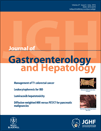
JOURNAL OF GASTROENTEROLOGY AND HEPATOLOGY
Scope & Guideline
Driving excellence in gastrointestinal and liver disease studies.
Introduction
Aims and Scopes
- Gastrointestinal Disorders and Diseases:
Research includes studies on various gastrointestinal disorders such as inflammatory bowel disease (IBD), functional gastrointestinal disorders, and colorectal cancer, with a focus on their pathophysiology, diagnosis, and treatment. - Liver Diseases and Hepatology:
The journal publishes extensive research on liver diseases, including hepatitis B and C, liver cirrhosis, hepatocellular carcinoma, and metabolic-associated fatty liver disease, emphasizing disease mechanisms, clinical management, and therapeutic advancements. - Endoscopic Techniques and Innovations:
A significant focus is placed on the development and evaluation of endoscopic techniques, including endoscopic submucosal dissection, capsule endoscopy, and advanced imaging modalities, aimed at improving diagnostic and therapeutic outcomes. - Microbiome and Metabolism:
Research on the gut microbiome's role in gastrointestinal and liver diseases is prevalent, particularly studies exploring microbiota composition, metabolic pathways, and their implications for disease management and treatment efficacy. - Clinical Trials and Therapeutic Interventions:
The journal features clinical trial results and studies evaluating new therapeutic agents, including biologics and novel pharmacological treatments, highlighting their effectiveness and safety in managing gastrointestinal and liver conditions. - Public Health and Epidemiology:
Contributions addressing the epidemiological aspects of gastrointestinal and liver diseases, including prevalence studies, risk factors, and public health interventions, are integral to the journal's scope.
Trending and Emerging
- Metabolic Dysfunction-Associated Liver Disease (MAFLD):
Research on metabolic dysfunction-associated fatty liver disease has gained prominence, with studies exploring its pathogenesis, management strategies, and implications for patient outcomes. - Artificial Intelligence in Gastroenterology:
The integration of artificial intelligence and machine learning technologies in diagnostic processes and treatment planning has become a significant focus, enhancing the accuracy and efficiency of clinical practices. - Gut Microbiome Research:
There is an increasing emphasis on understanding the role of the gut microbiome in gastrointestinal and liver diseases, with studies investigating its impact on disease progression and treatment responses. - Personalized Medicine Approaches:
Personalized and precision medicine approaches in treating inflammatory bowel disease and hepatological conditions are emerging as a key area, reflecting a shift towards individualized patient care based on genetic and phenotypic markers. - Telehealth and Virtual Care Models:
The COVID-19 pandemic has accelerated the adoption of telehealth and virtual care models, with ongoing research evaluating their effectiveness in managing gastrointestinal diseases and improving patient access to care. - Patient-Reported Outcomes and Quality of Life:
An increasing number of studies are focusing on patient-reported outcomes and health-related quality of life, particularly in chronic conditions like IBD and liver diseases, emphasizing the importance of patient perspectives in treatment evaluation.
Declining or Waning
- Traditional Pharmacological Approaches:
There has been a noticeable reduction in studies focusing solely on traditional pharmacological treatments for gastrointestinal and liver diseases, as interest shifts towards novel therapies and precision medicine. - Surgical Techniques in Gastroenterology:
Research pertaining to conventional surgical techniques has waned, with a growing preference for minimally invasive endoscopic procedures and innovative technologies for treatment. - Epidemiological Studies of Common Conditions:
While public health remains important, there is a decline in the volume of epidemiological studies focusing solely on common gastrointestinal conditions, as researchers increasingly target specific populations or emerging diseases. - General Reviews of Established Guidelines:
The publication of general reviews summarizing established clinical guidelines has decreased, as the focus has shifted towards innovative practices and real-world applications of new treatments.
Similar Journals

Translational Gastroenterology and Hepatology
Connecting Research to Real-World Solutions in Hepatology.Translational Gastroenterology and Hepatology, published by AME Publishing Company, stands as a pivotal platform for advancing the understanding and treatment of gastrointestinal and liver diseases. With its focus on translational research, this journal aims to bridge the gap between laboratory discoveries and clinical applications, thus fostering improvements in patient care. Although specific metrics like H-Index and Scopus ranks are currently unavailable, the journal is committed to maintaining high standards of scholarly communication and excellence. As an open-access publication, it ensures that valuable findings are readily accessible to a global audience, promoting collaboration and innovation among researchers, clinicians, and healthcare professionals invested in gastroenterology and hepatology. The journal's dedication to disseminating groundbreaking research makes it an essential resource for those seeking to stay at the forefront of these ever-evolving fields.
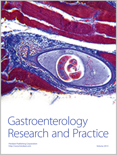
Gastroenterology Research and Practice
Elevating Standards in Gastrointestinal ResearchGastroenterology Research and Practice is a leading Open Access journal dedicated to advancing the field of gastroenterology and hepatology. Published by HINDAWI LTD, this journal offers a platform for researchers, clinicians, and healthcare professionals to share their findings and insights on cutting-edge topics in digestive health. With an ISSN of 1687-6121 and an E-ISSN of 1687-630X, it has established its significance within the academic community, evidenced by its ranking in the 2023 Scopus metrics, where it is positioned in the third quartile for both gastroenterology and hepatology disciplines. The journal is recognized for disseminating high-quality, peer-reviewed articles that contribute to the understanding of gastrointestinal disorders, therapeutic advancements, and innovative practices. Since its inception as an Open Access journal in 2008, Gastroenterology Research and Practice has removed barriers to access, ensuring that vital research reaches a global audience. This ongoing commitment to increasing accessibility, alongside its continuous publication from 2009 to 2024, underscores its importance as a resource for the academic and clinical communities striving to improve patient outcomes in digestive diseases.
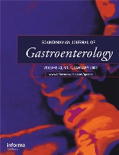
SCANDINAVIAN JOURNAL OF GASTROENTEROLOGY
Illuminating the Complexities of Gastrointestinal DiseasesSCANDINAVIAN JOURNAL OF GASTROENTEROLOGY, published by Taylor & Francis Ltd, is a leading journal in the field of gastroenterology, dedicated to advancing clinical and experimental research related to digestive health. With an ISSN of 0036-5521 and an E-ISSN of 1502-7708, this journal provides a platform for high-quality research that addresses the complexities of gastrointestinal diseases. Since its inception in 1966, the journal has consistently contributed valuable insights and is currently categorized in the Q2 quartile of gastroenterology journals, reflecting its impact and relevance in the field, with a Scopus rank of 87 out of 167 in Medicine - Gastroenterology. Researchers and practitioners are encouraged to explore the journal's archives to enhance their understanding and stay abreast of innovative strategies for managing gastrointestinal disorders. The SCANDINAVIAN JOURNAL OF GASTROENTEROLOGY remains a crucial resource for those committed to improving patient outcomes through rigorous scientific inquiry and the sharing of impactful findings.

WORLD JOURNAL OF GASTROENTEROLOGY
Connecting researchers with groundbreaking findings.WORLD JOURNAL OF GASTROENTEROLOGY, published by BAISHIDENG PUBLISHING GROUP INC, stands at the forefront of gastrointestinal research, providing a critical platform for the dissemination of high-quality studies in the field. With an impressive impact factor reflected in its Q1 rankings in both Gastroenterology and Miscellaneous Medicine, this journal is recognized for its rigorous peer-review process and commitment to advancing knowledge and practices related to digestive health. Covering comprehensive scopes from clinical advancements to innovative therapies, the journal serves an essential role for researchers, clinicians, and students, enabling them to stay updated on the latest developments and findings from 1998 through 2024. The open access model facilitates broader accessibility, ensuring that groundbreaking research reaches a global audience. The journal's ranking within the top 15% of Scopus demonstrates its significant contribution to the academic community, making it a valuable resource for advancing the science of gastroenterology.
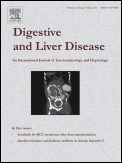
DIGESTIVE AND LIVER DISEASE
Unlocking the complexities of digestive and liver diseases.DIGESTIVE AND LIVER DISEASE is a prominent journal published by Elsevier Science Inc, dedicated to advancing the field of gastroenterology and hepatology. With an ISSN of 1590-8658 and an E-ISSN of 1878-3562, this journal has established itself as a significant resource within the academic community, especially considering its Q2 ranking in both gastroenterology and hepatology categories as of 2023. Spanning from 2000 to 2024, the journal presents a diverse array of peer-reviewed articles, clinical studies, and review papers that explore the latest advancements and research findings in digestive and liver diseases. The journal's robust impact, reflected in its Scopus rankings—40th out of 167 in gastroenterology and 28th out of 82 in hepatology—highlights its critical role in shaping practices and understanding in these vital areas of medicine. With open access options available, DIGESTIVE AND LIVER DISEASE aims to make high-quality research accessible to a wider audience, thereby encouraging collaboration and innovation. Researchers, healthcare professionals, and students alike will find valuable insights into the complex mechanisms, diagnostics, and therapeutic strategies pertinent to digestive and liver health.

Cellular and Molecular Gastroenterology and Hepatology
Unlocking insights in gastrointestinal and liver diseases.Cellular and Molecular Gastroenterology and Hepatology, published by Elsevier Inc, is a premier Open Access journal dedicated to advancing the understanding and treatment of gastrointestinal and liver diseases. Since its inception in 2015, this journal has established itself as a leading publication within its field, boasting impressive metrics with a 2023 Q1 ranking in both Gastroenterology and Hepatology. It ranks #10 out of 167 in Gastroenterology and #11 out of 82 in Hepatology on Scopus, placing it in the 94th and 87th percentiles, respectively. This journal aims to disseminate high-quality, peer-reviewed research that fosters innovative solutions for clinical challenges, making it an invaluable resource for researchers, healthcare professionals, and students alike. With open access, all published content is readily available to a global audience, ensuring that critical findings in cellular and molecular biology related to gastroenterology and hepatology reach those who can benefit the most from the latest advances in the field. For more information, please visit us at our address in San Diego, CA, or explore our articles online.
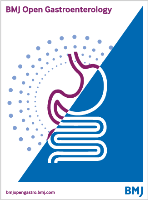
BMJ Open Gastroenterology
Elevating Patient Care with Open Access Gastroenterology ResearchBMJ Open Gastroenterology is a premier open access journal published by the esteemed BMJ Publishing Group, focusing on the dynamic and evolving field of gastroenterology. Established in 2014, the journal has rapidly ascended in stature, reflected in its impressive 2023 Q1 ranking in gastroenterology and its position within the top 25% of journals in the category according to Scopus. With a mission to disseminate high-quality, peer-reviewed research with global significance, the journal provides a vital platform for researchers, professionals, and students alike to share their findings and advancements in gastrointestinal medicine. Operating from its headquarters in London, England, the journal's open access format ensures wide visibility and accessibility of cutting-edge research, making it an invaluable resource for those dedicated to improving patient care and driving innovation in gastroenterological sciences. By engaging with this journal, contributors and readers can stay at the forefront of critical developments in the field, fostering a collaborative environment for knowledge exchange.

Canadian Journal of Gastroenterology and Hepatology
Empowering Healthcare through Open Access ResearchCanadian Journal of Gastroenterology and Hepatology, published by HINDAWI LTD, serves as a vital resource in the fields of gastroenterology and hepatology. Since its inception in 1987, this open-access journal has made significant contributions to advancing research and clinical practice through its comprehensive coverage of topics ranging from liver diseases to gastrointestinal disorders. With an impressive Q2 ranking in Gastroenterology and a Q3 ranking in Hepatology as of 2023, the journal has established itself as an influential platform for researchers and healthcare professionals seeking to disseminate and acquire knowledge. The journal is based in Egypt, with its operational headquarters located in London, England. Notably, it holds a respectable standing in Scopus rankings, placed at Rank #64 in Gastroenterology and Rank #34 in Hepatology, reflecting its impact and relevance in the medical community. With a commitment to quality and accessibility, the Canadian Journal of Gastroenterology and Hepatology continues to foster innovation and collaboration among its readers.

Gut and Liver
Exploring breakthroughs in gastrointestinal and liver diseases.Gut and Liver is a prestigious peer-reviewed journal dedicated to advancing the fields of Gastroenterology and Hepatology. Published by the EDITORIAL OFFICE GUT & LIVER in South Korea, this Open Access journal has been disseminating valuable research findings since 2007, making critical knowledge accessible to a global audience. With an impressive 2023 impact factor that places it in Q1 rank in both Gastroenterology (#28/167) and Hepatology (#22/82), it is recognized as a leader in the medical domain. The journal covers diverse topics, including innovative therapeutic strategies, clinical practices, and groundbreaking research in liver diseases and gastrointestinal disorders, thereby playing a vital role in improving patient care and outcomes. Researchers, healthcare professionals, and students can benefit from the journal's wealth of information, designed to foster collaboration and spark new ideas within the scientific community. For further engagement with current research, readers can access issues from 2009 to 2024 and stay updated on the latest advancements in the field.
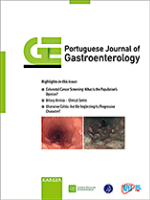
GE Portuguese Journal of Gastroenterology
Exploring Innovations in Digestive HealthThe GE Portuguese Journal of Gastroenterology, published by KARGER, is a prominent platform in the field of gastroenterology, providing a vital forum for the dissemination of high-quality research since its establishment. With an open access model implemented in 2012, the journal ensures that emerging findings in gastrointestinal health are readily accessible to a global audience, facilitating the exchange of critical knowledge among researchers, practitioners, and students alike. Based in Switzerland, this journal has earned a respected position within the academic community, currently holding a Q3 ranking in the gastroenterology category for 2023, alongside a Scopus rank of #113 out of 167 in its field. Spanning converged years from 2014 to 2024, the GE Portuguese Journal of Gastroenterology aims to bridge gaps in research and practice, fostering collaboration and innovation across diverse areas within the discipline. Authors and readers alike benefit from the journal's commitment to advancing knowledge and practice in gastroenterology.